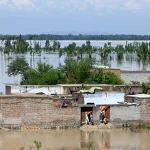The Election Commission of India (ECI) on Monday revealed it had recovered inducements worth just over $550 million since March — the largest amount in the country’s 75-year electoral history.
It marks a “sharp increase” on the more than $400 million in bribes seized by the ECI in the country’s last general election in 2019, the agency said.
The two states that saw the highest total amounts change hands are both strongholds of the ruling right-wing Bharatiya Janta Party (BJP): Rajasthan and neighboring Gujarat, home state of Prime Minister Narendra Modi.
While Gujarat recorded the largest amount in drug seizures, Rajasthan was top of the list for “freebies” — goods and services promised (usually by politicians) gratis to voters in exchange for their support.
Modi previously took aim at what he described as a culture of offering freebies for votes during a 2022 speech, urging voters to be careful.
“People of this Revdi (freebies) culture will never build new expressways, new airports or new defense corridors for you,” he said. “People of this Revdi culture think that by distributing freebies to people, they can buy them – together we need to defeat their thinking.”
The total value of freebies confiscated ahead of the 2024 vote marked a jump of nearly $130 million from the election five years ago.
Data from the ECI’s latest seizures meanwhile show non-BJP-ruled states also topped specific inducement categories.
The southern state of Tamil Nadu, a bastion for two regional parties that have held their own against both the BJP and the opposition Indian National Congress for decades, saw the most amount of cash seized.
One of the few Congress strongholds, Karnataka, had the most amount of liquor confiscated.
“The seizures are a critical part of ECI resolve to conduct the Lok Sabha elections free of inducements and electoral malpractices and to ensure a level playing field,” the Election Commission said Monday, referring to India’s parliament.
The ECI said it had also made seizures worth nearly $900 million in January and February, with drugs making up some 75% of those confiscations.
India’s political parties and leaders routinely preach against election corruption and inducements, but the level of monitoring and tackling of graft across such a vast nation varies widely.
Transparency International’s annual Corruption Perceptions Index ranks India 93rd of the 180 nations and territories it monitors, on par with Kazakhstan and the Maldives.
Earlier this year, India’s Supreme Court made a major ruling concerning the often opaque nature of political funding declaring electoral bonds “unconstitutional.”
The system, introduced by the Modi government in 2017, allowed individuals or groups to buy bonds from the government-run State Bank of India and donate them anonymously to any political party.
Anti-corruption groups had long complained that the system meant a lack of transparency in donations to political parties — allowing corporations to donate large sums without disclosure.
The court also urged the disclosure of details around contributors and recipients, paving the way for more transparency in how campaigns are funded.
Voting in India’s six-week long election will be conducted in seven phases from Friday, with Modi and his ruling party seeking a rare third consecutive term in power.


